Question
Problem 13-10 pg 651 1. net cash provided by operating activities First, we begin by calculating Accumulated Depreciation Credit and Gain on Sale of equipment.
Problem 13-10 pg 651
1. net cash provided by operating activities
First, we begin by calculating Accumulated Depreciation Credit and Gain on Sale of equipment. We will need them to calculate the Net Cash later.
Step 1:
Beginning balance Debits + Credits = Ending balance (why? see pg 642 for a good example)
Therefore, the following equation can be applied to the Accumulated Depreciation account to compute the depreciation to add back to net income:
Beginning balance Debits + Creditsequal= Ending balance
$xxx,000 $30,000 + Credits= $xxx,000
Credits= $xxx, 000 $xxx, 000 + $30,000
Credits= $xx, 000
Step 2:
Gain on sale of equipment: Equipment that had cost $40,000 and on which there was accumulated depreciation of $30,000 was sold during year 2 for $18,000 (pg 651 last paragraph). Now figure out by how much was the gain? $x, xxx. You will need this amount to calculate the Net Cash later; it should be subtracted from net income because this is a depreciable asset.
Step 3:
The guidelines from Exhibit 13-3 (pg 625) can be used to analyze the changes in noncash balance sheet accounts that impact net income as follows:
Increase in Account BalanceDecrease in Account Balance
Current Assets
Accounts receivable y1-y2 xx,000
Inventory y1-y2 xx,000
Prepaid expenses y1-y27,000
Current Liabilities
Accounts payable y2-y1+ xx,000
Accrued liabilities y2-y1 xx,000
Income taxes payable y2-y13,000
Tip: y1, y2 means year 1, year 2
(All these numbers are found in the balance sheet)
Tip: The gain on sale of equipment ($x,000) is subtracted from net income.
Step 4: Now compute the Net cash provided by plugging the numbers above. Also note the Net Income in income statement. Use it in computing the net cash provided by operating activities below
The net cash provided by operating activities is computed as follows:
Net income$56,000
Adjustments to convert net income to cash basis:
Depreciation$ xx,000
Increase in accounts receivable(xx,000)
Increase in inventory(xx,000)
Decrease in prepaid expensesx,000
Increase in accounts payablexx,000
Decrease in accrued liabilities(xx,000)
Increase in income taxes payablex,000
Gain on sale of equipment (x,000)(xx,000)
Net cash provided by operating activities$xx,000
2
Prepare a statement of cash flows
Investing and Financing activities:
The guidelines from Exhibit 13-3 can be used to analyze the changes in noncash balance sheet accounts that impact investing and financing cash flows as follows:
Increase in Account BalanceDecrease in Account Balance
Noncurrent Assets
Property, plant, and equipment y1-y2 xxx,000
Loan to Hymans Company y1-y2 xx,000
Liabilities and Stockholders Equity
Bonds payable y2-y1+ xxx,000
Common stock y2-y1+ xx,000
Please note that the loan to Hymans is recorded as a cash outflow in the investing activities section of the statement. Because Joyner did not retire any bonds during the year, the corresponding amount in the table on the prior page represents a cash inflow pertaining to a bond issuance. Joyner did not repurchase any of its own stock during the year, so the increase in common stock is reported as a cash inflow in the financing activities section of the statement. Property, plant, and equipment and retained earnings require further analysis as follows:
Property, plant, and equipment:
Beginning balance + Debits Creditseqls= Ending balance
$400,000 + Debits Credits= $510,000
Debits= $510,000 $xxx,000 + $xx,000
Debits= $xxx,000
Credit of $xx,000 is from cost of equipment
The additions to property, plant, and equipment from your debits answer above ($xxx,000) are recorded as a cash outflow and the proceeds from the sale of equipment ($18,000) are recorded as a cash inflow.
Retained earnings:
Beginning balance Debits + Creditseqls= Ending balance
$83,000 Debits + Credits= $124,000
$139,000= $xxx,000 + Debits
Debits= $xx,000
Tip: The dividend payment ($xx,000) should be recorded as a cash outflow in the financing activities section of the statement of Cash flow for Joyner (See below)
Joyner Company
Statement of Cash Flows
For Year 2
Operating activities:
Net income$xx,000
Adjustments to convert net income to cash basis:
Depreciation$ xx,000
Increase in accounts receivable(xx,000)
Increase in inventory(xx,000)
Decrease in prepaid expensesx,000
Increase in accounts payablexx,000
Decrease in accrued liabilities(xx,000)
Increase in income taxes payable x,000
Gain on sale of equipment(x,000)(3x,000)
Net cash provided by operating activitiesxx,000
Investing activities:
Proceeds from sale of equipmentxx,000
Loan to Hymans Company(xx,000)
Additions to plant and equipment y1-y2 + 40000(1xx,000)
Net cash used in investing activities(1xx,000)
Financing activities:
Issuance of bonds payable y2-y1xx0,000
Issuance of common stock y2-y1x0,000
Cash dividends (see retained earnings RE debits) (xx,000)
Net cash provided by financing activities 1xx,000
Net decrease in cash-17,000
Beginning cash and cash equivalents provided on pg 651 xx,000
Ending cash and cash equivalents provided on pg 651$x,000
3. Free cash flow computation:
Net cash provided by operating activities (see Question 1)$ xx,000
Capital expenditures (see property, plant, equip,debits)$xxx,000
Dividends (see retained earnings debits) xx,000 165,000
Free cash flow $(xxx,000)
4. Why did cash decline so sharply during the year? (Please be specific in your narrative).
Step by Step Solution
There are 3 Steps involved in it
Step: 1

Get Instant Access to Expert-Tailored Solutions
See step-by-step solutions with expert insights and AI powered tools for academic success
Step: 2

Step: 3

Ace Your Homework with AI
Get the answers you need in no time with our AI-driven, step-by-step assistance
Get Started


